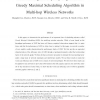Free Online Productivity Tools
i2Speak
i2Symbol
i2OCR
iTex2Img
iWeb2Print
iWeb2Shot
i2Type
iPdf2Split
iPdf2Merge
i2Bopomofo
i2Arabic
i2Style
i2Image
i2PDF
iLatex2Rtf
Sci2ools
122
click to vote
INFOCOM
2008
IEEE
2008
IEEE
Understanding the Capacity Region of the Greedy Maximal Scheduling Algorithm in Multi-Hop Wireless Networks
In this paper, we characterize the performance of an important class of scheduling schemes, called Greedy Maximal Scheduling (GMS), for multi-hop wireless networks. While a lower bound on the throughput performance of GMS has been well known, empirical observations suggest that it is quite loose, and that the performance of GMS is often close to optimal. In this paper, we provide a number of new analytic results characterizing the performance limits of GMS. We first provide an equivalent characterization of the efficiency ratio of GMS through a topological property called the local-pooling factor of the network graph. We then develop an iterative procedure to estimate the local-pooling factor under a large class of network topologies and interference models. We use these results to study the worst-case efficiency ratio of GMS on two classes of network topologies. We show how these results can be applied to tree networks to prove that GMS achieves the full capacity region in tree ne...
Communications | Efficiency Ratio | INFOCOM 2008 | Local-pooling Factor | Worst-case Efficiency Ratio |
Related Content
| Added | 31 May 2010 |
| Updated | 31 May 2010 |
| Type | Conference |
| Year | 2008 |
| Where | INFOCOM |
| Authors | Changhee Joo, Xiaojun Lin, Ness B. Shroff |
Comments (0)

